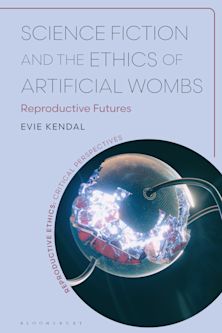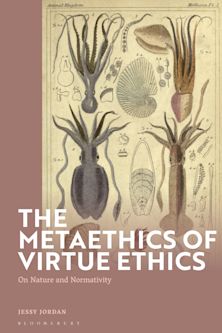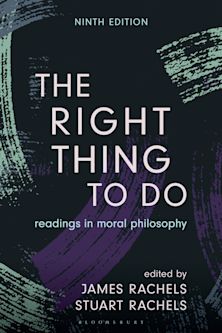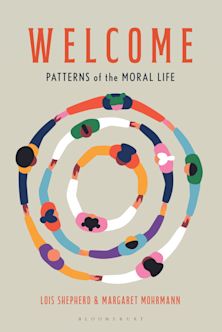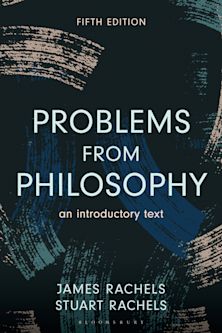- Home
- ACADEMIC
- Philosophy
- Ethics and Moral Philosophy
- Truth and Norms
Truth and Norms
Normative Alethic Pluralism and Evaluative Disagreements
Truth and Norms
Normative Alethic Pluralism and Evaluative Disagreements
You must sign in to add this item to your wishlist. Please sign in or create an account
Description
Truth and Norms: Normative Alethic Pluralism and Evaluative Disagreements engages three philosophical topics and the relationships among them. Filippo Ferrari first contributes to the debate on the nature and normative significance of disagreement, especially in relation to evaluative judgements such as judgements about basic taste, refined aesthetics, and moral matters. Second, he addresses the issue of epistemic normativity, focusing in particular on the normative function(s) that truth exerts on judgements. Third, he contributes to the debate on truth—more specifically, which account of the nature of truth best accommodates the norms relating judgements and truth. This book develops and defends a novel pluralistic picture of the normativity of truth: normative alethic pluralism (NAP). At the core of NAP is the idea that truth exerts different normative functions in relation to different areas of inquiry. Ferrari argues that this picture of the normativity of truth offers the best explanation of the variable normative significance that disagreement exhibits in relation to different subject matters—from a rather shallow normative impact in the case of disagreement about taste, to a normatively more substantive significance in relation to moral judgements. Last, Ferrari defends the view that NAP does not require a commitment to truth pluralism, since it is fully compatible with a somewhat refined version of minimalism about truth.
Table of Contents
Acknowledgments
Introduction
Chapter 1: Alethic Minimalism
Chapter 2: Truth and the Semantics of Evaluative Judgements
Chapter 3: Disagreement and its Normative Significance
Chapter 4: A Comparative Analysis of Disagreement in (some) Evaluative Domains
Chapter 5: Dimensions of the Normativity of Truth
Chapter 6: Pluralism, Minimalism and mNAP
Chapter 7: Alethic Minimalism and Normative Extrinsicism
Conclusion
Bibliography
Index
About the Author
Product details
| Published | Nov 15 2021 |
|---|---|
| Format | Ebook (Epub & Mobi) |
| Edition | 1st |
| Extent | 222 |
| ISBN | 9781793622686 |
| Imprint | Lexington Books |
| Illustrations | 1 tables; |
| Series | Philosophy of Language: Connections and Perspectives |
| Publisher | Bloomsbury Publishing |
About the contributors
Reviews
-
Ferrari’s book is an outstanding contribution to several ongoing debates. They include debates on the nature of disagreement, normativity, and, of course, the nature of truth. It is required reading for philosophers working on truth, and its insights on disagreement and normativity are valuable.
Notre Dame Philosophical Reviews
-
This is a timely and important book that integrates and contributes significantly to a range of contemporary philosophical debates including those focused on the nature of truth and its normative role in enquiry, and the controversies concerning the normative significance of peer disagreement about varying subject matters. Focusing on different kinds of value judgement—judgements of personal taste, aesthetic judgements, and ethics—Ferrari defends a monistic, minimalist account of truth, close in spirit to the ideas advocated by deflationists, and argues against pluralistic accounts of truth’s nature that the primary motivations for pluralism can be as well accommodated by recognizing a number of distinct dimensions in which, across these varying types of judgement, truth itself is valuable and falsity disvaluable.
Ferrari’s book is very clearly written and, besides providing a novel direction on the aforementioned debates, is also well suited to serve as an introduction to them for advanced students and professionals specializing in other areas of philosophy. It deserves to be widely read and influential.Crispin Wright, New York University
-
Ferrari’s book offers an intelligent and engaging discussion of the many functions of truth in disagreement and the bearing this has on philosophical debate about the nature of truth.
Matthew Chrisman, University of Edinburgh
-
This is a sophisticated, innovative, and comprehensive account of the various normative dimensions of truth. Ferrari's impressive book is sure to play an influential role in debates about truth, normativity, and disagreement.
Douglas Edwards, Utica College
-
Ferrari’s book tackles some of the largest issues in metaphysics and epistemology. His discussion sits at the intersection of three topics: the epistemic significance of disagreement; the source and nature of epistemology’s norms; and the nature of truth itself. I know of few contemporary theorists ambitious enough to take on all of these topics at once. For his part, Ferrari shows himself more than capable of bringing illumination to these issues. His discussion teaches us that we might reach greater understanding of each by connecting these topics to one another. I highly recommend his book to anyone working in these areas.
Sanford C. Goldberg, Northwestern University
-
In this clear and incisive new book, Filipo Ferrari defends an original position about truth according to which truth is minimal, but it plays robustly different normative roles across kinds of inquiry. Ranging across debates in epistemology, philosophy of language, morality, and aesthetics, Ferrari breaks new ground in truth theory--highly recommended for anyone working in these areas.
Michael P. Lynch, University of Connecticut

ONLINE RESOURCES
Bloomsbury Collections
This book is available on Bloomsbury Collections where your library has access.


















